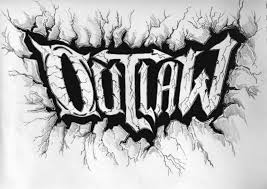outlaw
英 [ˈaʊt.lɔː]
美 [ˈaʊt.lɑː]
- n. 歹徒;罪犯;亡命之徒;被剥夺法律保护者
- vt. 宣布…为不合法;将…放逐;剥夺…的法律保护
- n. (Outlaw)人名;(英)奥特洛
使用频率:

记忆方法
将“outlaw”分解为“out”和“law”。联想一个行为“走出法律之外”的人或事物,成为一个“非法者”。这种方法通过将“out”理解为“超越”或“不在”,与“law”(法律)结合,形成一个违反法律、不受法律保护的形象,有助于记忆。
以上内容由AI生成, 仅供参考和借鉴
中文词源
outlaw 宣布非法
out-,超过,law,法律。即超过法律允许的范围,非法。
英语词源
- outlaw (n.)
- Old English utlaga "one put outside the law" (and thereby deprived of its benefits and protections), from a Scandinavian source such as Old Norse utlagi (n.) "outlaw," from utlagr (adj.) "outlawed, banished," from ut "out" (see out (adv.)) + *lagu, plural of lag "law" (see law).
[G]if he man to deaðe gefylle, beo he þonne utlah ["Laws of Edward & Guthrum," c.924]
Meaning "one living a lawless life" is first recorded 1880. As an adjective from Old English. - outlaw (v.)
- Old English utlagian "to outlaw, banish," from utlaga "an outlaw" (see outlaw (n.)). Related: Outlawed; outlawing.
权威例句
- 1. plans to outlaw the carrying of knives
- 宣布携带刀具为非法的方案
- 2. The authorities put a price on the outlaw's head.
- 当局悬赏缉拿逃犯.
- 3. The outlaw hid out in the hills for several months.
- 逃犯在山里隐藏了几个月.
- 4. The outlaw was granted sanctuary in the church.
- 这名犯法者获准在教堂里避难.
- 5. The outlaw has been caught.
- 歹徒已被抓住了.